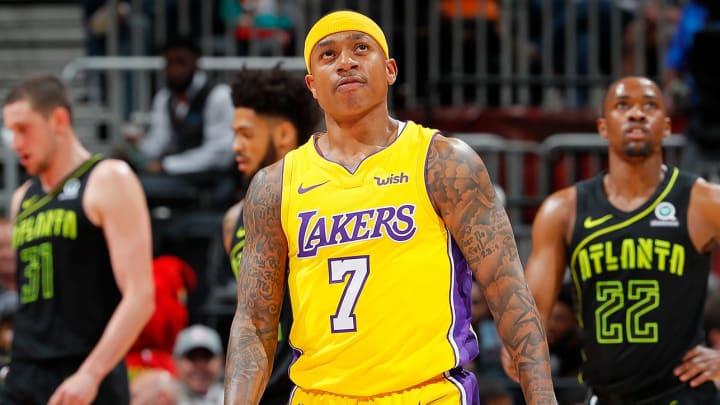Isaiah Thomas’s Nightmare Contract Year Sputters to a Close With Season-Ending Surgery

Isaiah Thomas’s nightmare season is officially and mercifully over, brought to a premature close by the hip surgery he had long hoped to avoid.
The Lakers announced Wednesday that the two-time All-Star point guard will undergo arthroscopic surgery on the bothersome right hip that kept him from recapturing the often-magical form he showed last season with the Celtics. After becoming one of the league’s most underpaid stars in Boston, the 29-year-old Thomas spent his long-awaited contract year sidelined for months, traded from Cleveland to LA, and then dumped to a sixth man role with the Lakers as he struggled badly on both ends.
Even under hindsight’s harsh glare, Thomas had good reason to attempt to rehabilitate his hip and play through the pain. The Cavaliers offered three things any upcoming free agent would want: the chance to compete for a title, a complementary role alongside LeBron James, and a deep-pocketed owner in Dan Gilbert willing to pay big to keep a winner together.
A trip to the Finals with James leading the way could have resuscitated the “Brinks Truck” talk from his Celtics years. Thomas theoretically could have been the top unrestricted free agent at his position, assuming Chris Paul re-ups with the soaring Rockets, and a marketable face for directionless franchises like the Knicks and Bulls. In a best-case scenario, Thomas could have spent July choosing between locking in long-term as James’s sidekick and returning to a leading role for a high-profile team with 2019 playoff aspirations.
But that dream world is long gone now, leaving Thomas to ponder a worst-case scenario that he surely never thought was coming. Less than one year after the 5’9” point guard finished fifth in 2017 MVP voting, he must start over from scratch. Thomas, who steadily climbed over six seasons from the 2011 draft’s Mr. Irrelevant to superstar status, is stuck facing the most fundamental questions once again.
Can he recapture his scoring prowess? Are his defensive limitations too much for most teams to overcome? What’s his ideal role: lead guard or spark-plug scorer? Will he recover his athleticism after the surgery? If not, will he have the personality and temperament to adjust to his changing circumstances?
Thomas’s injury-plagued season offers little in the way of comfort. His bread-and-butter scoring ability—borne of creativity, assertiveness to the basket and dependable three-point shooting—abandoned him. Thomas’s scoring average plunged from 28.9 PPG to 14.2 PPG, with his free-throw rate and three-point shooting both dropping sharply. Instead of being a James Harden-light focal point to a successful offense like he was in Boston, Thomas was a drag on his teams’ attacks. Both Cleveland and LA had higher offensive efficiency numbers without him, in large part because he couldn’t create the same high-percentage looks. In fact, Thomas’s shooting efficiency ranks dead last among players with at least 12 attempts per game.
2017-18 Season: Worst Effective FG% (Min. 12 shots per game & 30 games)
1. Isaiah Thomas: 43.8 eFG% on 13.2 shots per game
2. Dennis Smith: 44.5 eFG% on 14.8 shots per game
3. Dion Waiters: 46.1 eFG% on 13.7 shots per game
4. John Wall: 46.1 eFG% on 15.3 shots per game
5. Kris Dunn: 46.2 eFG% on 12.8 shots per game
That list provides for some interesting comparison points: Waiters and Wall, like Thomas, were submarined by injuries, while Smith and Dunn are young guards still trying to establish themselves in the league. The optimist would say that Thomas, Waiters and Wall should all bounce back once healthy next year. The pessimist would point out, though, that Waiters and Wall have long-term contracts and defined roles in Miami and Washington, respectively. Thomas lacks both contractual security and a home.
To make matters worse, Thomas’s need to reclaim his scoring acumen is only half the challenge. His lack of size has made him an easy-to-exploit defender throughout his career, and that’s not going to change once he returns from hip surgery. As context, the Cavaliers and Lakers both performed far better defensively when Thomas was off the court, and he ranked among the NBA’s bottom-five players in Defensive Real-Plus Minus.
2017-18 Season: Worst Defensive Real-Plus Minus
1. Jamal Crawford: minus-5.45
2. Troy Daniels: minus-4.29
3. Lou Williams: minus-3.83
4. Emmanuel Mudiay: minus-3.80
5. Isaiah Thomas: minus-3.62
Kawhi Leonard and the Limits of Spurs Culture
Here again, the comparison players are illuminating. Crawford and Williams are proven sixth men who have enjoyed long-term success as one-way contributors. Daniels is a fringe talent known for his shooting and little else. Mudiay’s NBA career, meanwhile, is on life support given his detrimental impact on both sides of the ball. Collectively, this group sets the stakes for Thomas’s future. If he can get his body right, he should be able to follow the trail blazed by Crawford and Williams. If his scoring game doesn’t return, his NBA prospects get very bleak, very quickly.
Given this evidence, Thomas’s surgery decision should have been an easy one. Carrying on as one of the league’s least-efficient shooters and worst defenders was a path to nowhere.
While Thomas blanched at the Lakers’ plans to utilize him as a sixth man following his mid-season trade, he would do well to recalibrate his expectations and public message during his rehabilitation time. His enormous self-belief carried him to stardom once, and a second act as a high-volume scorer is certainly still possible pending a full recovery. But Thomas may find that the best way to rebuild his value is by fully buying into a narrower role and settling for a short-term deal this summer.
Then again, he may discover, as he did in LA, that he doesn’t have much of a choice.

Ben Golliver is a staff writer for SI.com and has covered the NBA for various outlets since 2007. The native Oregonian and Johns Hopkins University graduate currently resides in Los Angeles.